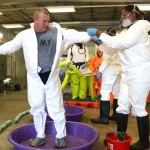Sunshine Education and Research Center links multiple disciplines to improve the wellbeing of workers
First published on July 13, 2015 in observance of the COPH’s 30th anniversary celebration. Founded in 1997 by a training grant supported by the National Institute for Occupational Safety and Health, the Sunshine Education and Research Center at the USF College of Public Health stemmed from an industrial hygiene training […]





